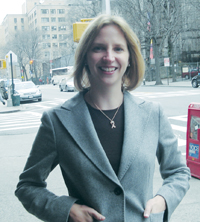|
|
 |
 |
|
ALUMNI UPDATESDr. Rebekah Gee ’97, Women’s Health Care Activist

Dr. Rebekah Gee ’97, ’98 PH, posing near campus this past spring, successfully sued Wal-Mart to ensure that all its pharmacies carry Plan-B. PHOTO: MARYAM PARHIZKAR ’09 
In February 2006, Massachusetts became the second state, after California, to require Wal-Mart to stock emergency contraception in its local stores. This came after three women sued the company for not carrying the “morning-after” pill, also known as Plan-B and Levonorgestrel. One of the women was Dr. Rebekah Gee ’97, ’98 PH, an activist physician now living in Pennsylvania. “In news conferences, we said [to Wal-Mart], ‘We’ll see you in every state,’ ” Gee says regarding their efforts to nationalize the change, which received attention across the country and was covered on NPR and CNN. “Within a couple of weeks, they ended up changing their national policy on E.C.” It was in 2004 that Gee became involved in the lawsuit, after one of her patients was refused E.C. at a local branch in Massachusetts. “Wal-Mart was the only national pharmacist that refused to sell Plan-B,” she says. She and two other women, Trina McCarney and Julie Bates, took Plan-B prescriptions to Wal-Mart to see if they would be filled. All three were refused. As a result, the women took the corporation to court with the support of NARAL Pro-Choice America, Planned Parenthood and the Massachusetts Board of Pharmacy. Today, Plan-B can be acquired at any Wal-Mart pharmacy. Gee’s interest in public health issues began while she was in college. In the summer before her senior year, she held an internship at the Department of Health and Human Services in The Office of Women’s Health in Washington, D.C. “I saw how powerful it is when you make policies that can improve the health of a population,” she notes. Consequently, Gee, an American history major who earlier had dropped the pre-med program, decided to finish pre-med requirements in her last year. She went to the School of Public Health and earned a master’s in health policy and management. During her time there, Gee worked on a project in the Amazon region of Ecuador on women’s and sexual health, helping bring in clean water and educating people on basic public health needs. As a medical student at Cornell, from which she earned her M.D. in 2002, Gee spent more time abroad, this time in Cuba to study child and maternal health. While there, she also observed health care in a single-party system, “a system where health car was not limited by wealth,” she notes. “If Cuba can do it, we should be able to provide health care for every American.” Gee completed her ob/gyn residency at Harvard, in the Brigham and Women’s Hospital and Massachusetts General. She also earned leadership experience as a Clinical Practice Guidelines committee member of the American College of Obstetricians and Gynecologists (2005), American Medical Association Representative to the Council on Scientific Affairs (2001–02) and on the AMA-Medical Student Section Reference Committee (2001). While at Harvard, Gee was struck by a news report on a woman in Massachusetts who was raped but not given emergency contraception. Questioning what she could do to change the situation through her involvement in the medical community, Gee co-authored a bill for the Massachusetts legislature in 2005, “An Act to Provide Timely Access to Emergency Contraception,” sponsored by Sen. Pamela P. Resor (D-Mass.). Originally it was vetoed by then-Governor Mitt Romney (R), based on his beliefs that Plan-B functioned like an abortion pill. However, the House and Senate overrode his veto, and the bill was passed in 2005. Gee describes it as an “ incredible experience,” noting how scientific information on how Plan-B functioned — as a contraceptive and not as an abortion pill — was what ultimately contributed to the Senate bill decision. Gee now is an attending physician at the Veterans Affairs hospital in Philadelphia. She also is completing post-doctoral training as a Robert Wood Johnson Clinical Scholar at the University of Pennsylvania, where she taught health care leadership and policy to resident physicians for the recent academic year, and is physician adviser to Pennsylvania Governor Edward Rendell (D) in the Office of Health Care Reform. She also is working to publish a health care study on the intervention of health education in the Latina community and hopes to work in the public sector of government to improve health care. Gee looks back on her Columbia experience as a major part of her influences as an activist. “I learned to argue unpopular ideas — I think Columbia taught me [that]. Members of my class were very brave,” she states. “As a conservative Mormon woman from Utah, the conversations we had made an incredible opportunity for me ... I learned to question the status quo, and why it had to be that way.” Because of the Wal-Mart lawsuit, Gee has been attacked by conservative critics, including the likes of Rush Limbaugh, but she stands behind her beliefs. “A public company doesn’t have the right to deny service,” she says. By Maryam Parhizkar ’09
|
|
||||||||||||||||||||||||||||